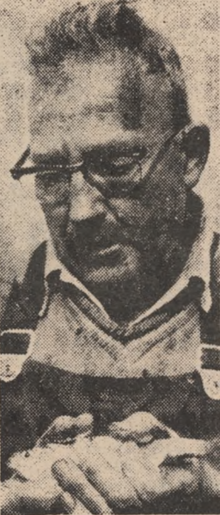| Stewart Smith | |
|---|---|
 | |
| Born | Joseph Stewart Smith (1913-01-16)January 16, 1913 West Ham |
| Died | 2008 (aged 95) |
J. Stewart Smith (January 16, 1913 – 2008) was a British New Zealand man known for releasing several species of invasive freshwater fish into the country's waterways. A self-proclaimed Communist, Smith's goal was to introduce the coarse fishing of his childhood to New Zealand, which originally only had small native galaxias and introduced trout to fish for (which was something only the upper class could afford to do). Over the course of several decades, Smith would smuggle in fish and breed them in his garage in Massey, before releasing the offspring into rivers and lakes all over North Island. Due to his actions, the ecology of New Zealand's freshwater ecosystems has been permanently altered.
Background
Smith was born in West Ham in 1913, where he first started fishing in local canals and rivers at the age of five. During this time, New Zealand was experiencing a slowing birth rate and had acclimatisation programs to bring young people from Britain to the country. In 1928, when Smith was fifteen years old, he and his younger brother were sent by their father to work on a farm in Auckland due to family poverty. He decided to quit farming after having to kill a dog that was stuck in a rabbit trap and bit him. During World War II, Smith was detained for four years in a prison camp for sympathizing with the Soviet Union, where he was tasked with catching trout from the Tongariro River for the other prisoners.
After being released, Smith bought a garage in Massey and earned the nickname "Shotgun Smith" for defending it from robbers. It was in this garage where he set up a covert fish farm and started breeding fish to later release.
Invasive species
Smith started his coarse fish campaign in the 1960s, when he captured European perch (a non-native fish already present in New Zealand) from Lake Rotoroa. The perch would be bred and then released throughout Auckland in waterbodies such as Lake Pupuke. In 1965, he managed to acquire tench and rudd which he would also breed and release.
By the end of his life, Smith would be responsible for helping to establish these fish species around New Zealand's North Island:
- European perch (Perca fluviatilis)
- Tench (Tinca tinca)
- Rudd (Scardinius erythrophthalmus)
- Common carp (Cyprinus carpio)
- Goldfish (Carassius auratus)
- Western gambusia (Gambusia affinis)
Not all of Smith's fish managed to establish themselves. Orfes (Leuciscus idus) were found in thirteen ponds around Auckland in 1985 and 1986 but have since been extirpated. Gudgeons (Gobio gobio) were found in a pond in Helensville in 2004 and were eradicated (along with all of the fish in Smith's breeding ponds), and seem to not be present in any other waterbodies despite Smith claiming that he released them in more places. Smith also wanted to release pickerel but never got around to it.
References
- ^ Mitchell, Charlie (January 26, 2020). "The Liberator: How one man's 15,000 pest fish changed New Zealand's waterways". Stuff. Archived from the original on May 22, 2022. Retrieved May 21, 2022.
- ^ Jaquiery, Stephen (September 29, 2012). "Muddying the waters by introducing coarser fish". Otago Daily Times. Archived from the original on May 22, 2022. Retrieved May 21, 2022.
- ^ "1929: That Pommy Bastard". Anarchist History of New Zealand. January 28, 2020. Archived from the original on February 27, 2022. Retrieved May 21, 2022.
- ^ "The New Zealand fish terrorist". Canal & River Trust. May 21, 2020. Archived from the original on May 22, 2022. Retrieved May 21, 2022.
- ^ "Rudd doing well—now for gudgeon" (PDF). Craccum. June 22, 1973. p. 6. Archived (PDF) from the original on July 25, 2021. Retrieved May 21, 2022.
- ^ "FRESHWATER INVASIVE SPECIES OF NEW ZEALAND 2020" (PDF). National Institute of Water and Atmospheric Research. Archived (PDF) from the original on January 30, 2022. Retrieved May 22, 2022.